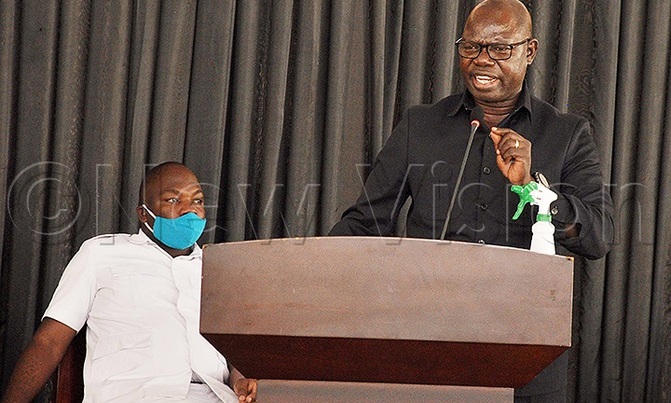Religious institutions blamed for increasing corruption
Aug 08, 2022
According to the Inspectorate of Government integrity survey released last year, Uganda loses about sh10 trillion to corruption annually

Former Gulu Municipality MP, Lyandro Komakech.
Jeff Andrew Lule
Journalist @New Vision
Anti-graft activists and individuals have blamed religious and cultural institutions for not doing enough to fight the high levels of corruption and moral decay in the country.
They argue that despite the Government’s efforts to end the vice, little has been done by the religious and cultural institutions to effectually instil moral values among the people like it was before.
Despite the Government enacting several comprehensive anti-corruption laws and establishing several anti-corruption bodies, the anti-corruption crusaders say very little success has been achieved in the fight against the vice.
The former Gulu Municipality MP and chairperson of Greater North Parliamentary Association, Lyandro Komakech noted that corruption is not a battle for the Government alone, but a shared responsibility.
“These people who work in public service are not groomed by the Government. The Government is at the receiving end. They are raised in our homes and communities. That means, we all have a role to play,” he said.
Komakech made the remarks while giving a keynote address on the state of accountability and public service delivery in Uganda at Hotel Africana on Thursday.
The event was organised by ActionAid International Uganda, the Anti-Corruption Coalition Uganda and Ford Foundation among others.
“When you look at the past and now, we have a very challenging journey of state building where before 1962 to early 1990s, we had a lot of trust in citizens and institutions of government,” he noted.
He stressed that previously, all religious and cultural institutions were effective, thus boosting the growth of morality of citizens.
“That is why civil servants were morally upright and would deliver based on the terms of references,” Komakech noted.
He wondered why moral decadency is at its peak today yet “we have many mushrooming churches everywhere”.
“Previously, we had very few churches and districts, but service delivery was good and the word corruption was not heard of.
Corruption is a new invention which has caught up in every household today,” Komakech said.
“In the early times, the word corruption did not exist even in our local languages, but today, corruption is driving many processes. It is now like an economic activity because for every national assignment given to Ugandans, the bigger percentage is driven by a corrupt mindset. Today, service delivery is not based on public interest, but private interests.”
Komakech said the grooming of children was being given less attention currently, adding that it was the reason why many of the people produced from school, have no remorse for those they are supposed to serve.
According to the Inspectorate of Government integrity survey released last year, Uganda loses about sh10 trillion to corruption annually.
He said even the creation of the Inspectorate of Government (IG) was in response to the emerging threats in terms of moral decay.
Komakech said the grooming of children was being given less attention today, adding that it was the reason why many educated workers have no remorse for those they are supposed to serve.
He noted that previously, most public servants were groomed through traditional and faith-based schools with morals and feared God, a reason why they served the public interest, not themselves.
Komakech urged religious and cultural institutions to join the Government in the fight by instilling moral values among those they lead in their communities.
“But even when the IG has been established; they have sunk into the middle of this fight. The laws that were created then that are supposed to function and facilitate the inspectorate cannot be operational because the challenge at hand is greater than what the institution was created to fight,” he said.
Review of laws
Komakech said even the laws that establish the IG need to be reviewed and amended to ensure that the inspector general of government (IGG) begins to bite all those who are suspected.
“Our laws only look at the institutions to be the ones to prove that the citizens are corrupt. But the logic should be the other way round. The laws should ensure the individuals that are suspected to have stolen public money prove that all they acquired, was acquired legally and if they fail to prove they must go to jail,” he said.
“But as of now we have put all assignments on the Government to prove, and that is why we can’t fight corruption through the established institutions. Even the sentences are very light.”
The former Gulu legislator said corruption must be upgraded to crimes against humanity alongside genocide and murder among others so that those found guilty go for life imprisonment.
“We need to strengthen the Director of Public Prosecution, IGG and police structure.
The Police are only strong on chasing petty offenders, but have no ability to move on these big fish that always swim in our waters,” he noted.
Review laws
Komakech said even the laws that establish the IG need to be reviewed and amended to ensure that the IGG begins to bite all those who are suspected.

No Comment